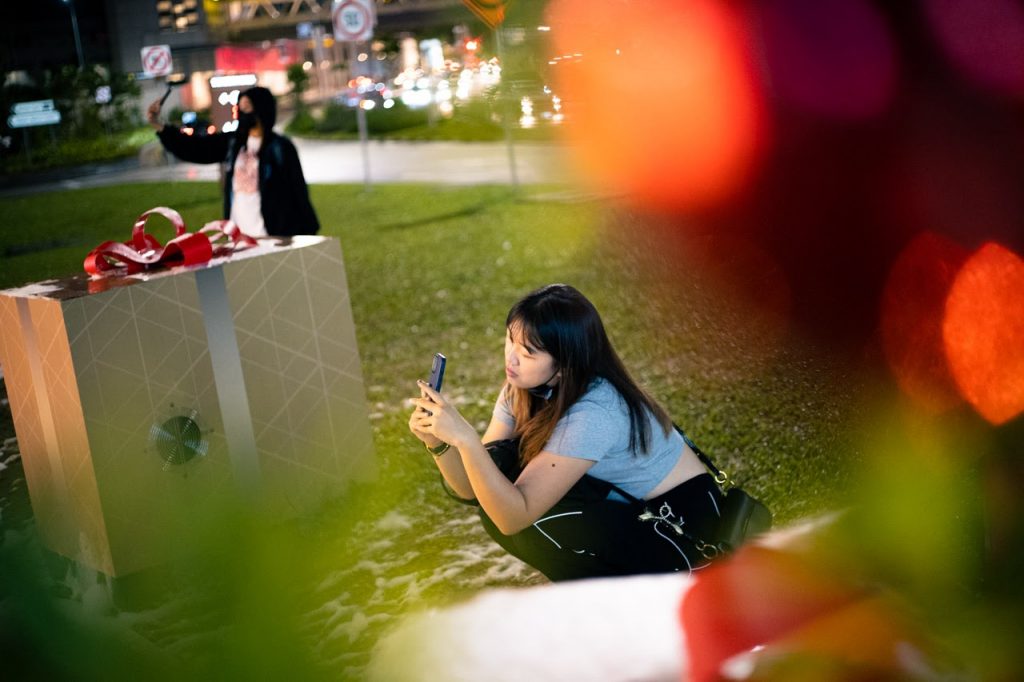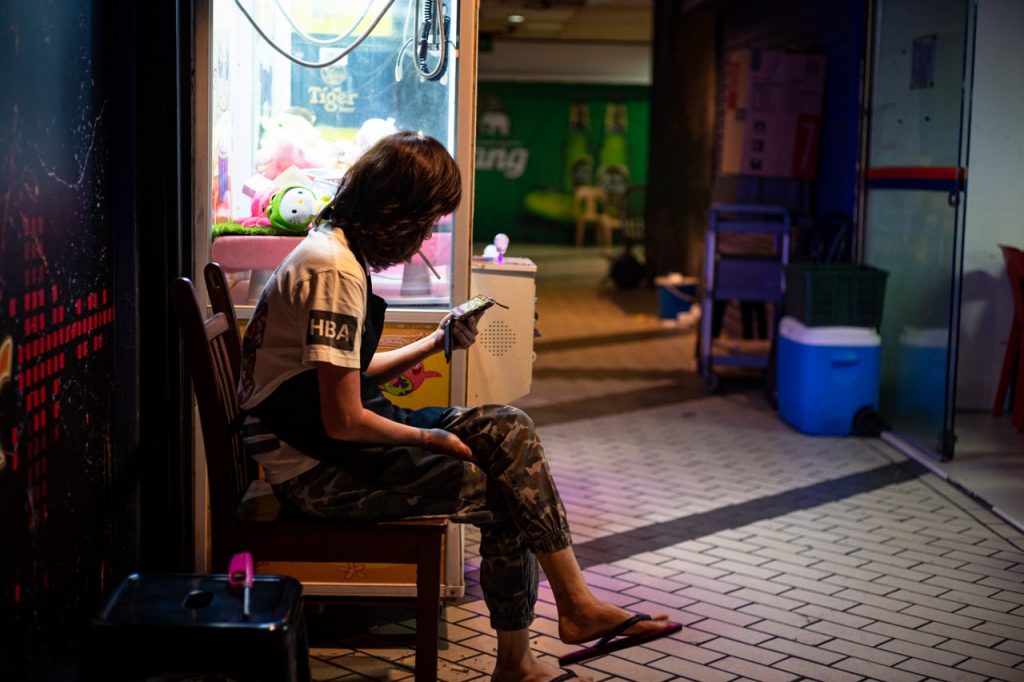Top image: Stephanie Lee / RICE file photo
This story is part of RICE Media’s Storytellers initiative, a mentorship programme for budding content creators to learn about the art of creative non-fiction. This piece is a product of a partnership between RICE Media and Singapore Management University (SMU) for its Professional Writing module.
Every afternoon, I stood in a quiet corner of the school corridor, struggling to hold back my tears as I heard my own voice tremble with emotion on a phone call. It became a routine: after lunch, I would dial my parents’ number, eager to share with them about my morning.
They were my sole confidants, my sanctuary in a sea of unfamiliarity. Every conversation with them felt like a cherished moment. At just 12 years old, alone in Singapore, this scene repeated almost every day for the first three months I arrived here.
Fast-forward five years. I’m bursting out, “Wahlao, my parents are calling me again, sia! Y’all shhh!”
The contrast is striking: I had grown accustomed to my surroundings, forged new friendships, and fully embraced the freedom I now enjoy.
My parents often call me throughout the day to check in on me. However, their calls occasionally feel like an inconvenience, disrupting my work or leisure, and sometimes spark fear—the fear that they’ll discover I’m staying out past my curfew. I sometimes find myself ignoring their calls during such instances.
International students with strict Asian parents would likely agree with the latter. We often find ourselves bound by numerous rules, beliefs, and restrictions. Ignoring calls may seem contrary to the values of respect and filial piety ingrained in our culture.
Yet, at times, it is the only strategy to maintain our freedom and privacy.
Our parents constantly remind us that their actions stem from love and care. Instead of embracing their gestures with gratitude, we often choose defiance.

Call Me Maybe
At 16, Jordan went to study in Australia after completing his O-levels. He had been worried about the prolonged separation from his family before his departure abroad, but things quickly changed after a few months.
During the first month, he maintained daily calls with his family. As time passed, the frequency of their calls shifted from once a week to once a month.
“We rarely call now but mostly text each other to check in,” Jordan says.
Six months into his studies, Jordan found himself immersed in a vibrant social life, forming numerous friendships and even entering a romantic relationship. He admitted to occasionally ignoring his parents’ calls, particularly when occupied with friends or spending time with his girlfriend.
Jordan’s parents are quite open and didn’t impose much restriction on him, except for smoking. However, they placed significant emphasis on his studies. As such, he’s yet to disclose his love life, concerned his parents might think it would affect his studies.
“My parents are usually the ones who initiate the call lah, I rarely call them first. But I also try to text them quite often about how my life has been,” Jordan adds.

Lynn, originally from Myeik, Myanmar, came to Singapore at the age of 19 to pursue a diploma in a polytechnic.
Her parents maintained frequent contact, calling her daily to ensure her well-being. However, they just couldn’t shake their worry about leaving their daughter alone in a foreign country.
“My dad asked me to install Life 360, a location tracking app, for safety reasons,” Lynn recalls. In the event that she is unreachable through phone calls, the app would allow her parents to verify her whereabouts.
When questioned about intentionally ignoring her parents’ calls, Lynn acknowledges doing so when she is in a bad mood.
“If I pick up their calls when I’m annoyed, I will talk to them in an impatient tone—but I’ll feel guilty for doing so after,” Lynn explains.
During such moments, she often ends the call and texts them to say that she’s busy. I relate to her actions—I too value personal space and time, especially during periods of emotional strain.
Reflecting on the first time she ignored her parents’ calls during a late outing, Lynn recalls: “My dad kept calling me through Messenger and Viber. I only pick up when my mum calls me through roaming.”
While her parents’ persistent calls are perceived as a nuisance in the moment, they underscore their genuine concern for her well-being.
After three years passed, their calls became less frequent, occurring only once every few days. Her parents also gradually eased their restrictions on her late-night outings, so she is no longer afraid to pick up their calls during those times.
“They know I’m independent and can handle things by myself, so they are less worried. I have the app installed until now, but my dad no longer actively checks it.”
My conversation with Lynn leaves me pondering numerous questions.
Do we really know the truth behind their constant calls? Were they just being restrictive or genuinely concerned about us? Should we seize every opportunity to make the most out of every call while we still have the chance?
‘Have You Eaten?’
People have varied motives for deliberately ignoring their parents’ calls, whether it’s a quest for freedom, privacy, or solitude.
The reality is that studying far from home casts a veil of anxiety and helplessness in our parents. It’s tough for them to offer support or reassurance from afar. Thus, hearing their children’s voices becomes paramount in soothing their worries.
Each phone call with my parents follows a familiar script: “Have you eaten?”, “Are you tired today?”, “Remember to sleep early.” While their words are laden with concern, I can’t help but perceive them as annoyance at times.
The guilt is real. I’m inadvertently overlooking them—the very reason why I am able to study abroad in the first place.

When discussing this topic with my Singaporean friends, some expressed surprise at my occasional decision to ignore my parents’ phone calls deliberately. However, most, if not all, agreed on the importance of promptly answering their parents’ calls, recognising them as potentially urgent.
“For me, my parents only call when they need help buying something or doing something,” explains Dominic.
Due to their busy work schedules, Dominic doesn’t see his parents daily. However, they catch up whenever they meet. Living under the same roof, his parents don’t feel the need to constantly check in on him when he’s not home.
“They only call if I forget to inform them that I’m staying out overnight.”
Texting vs Calling
In today’s fast-paced world, many of us have developed a strong aversion to phone calls. Some see them as anxiety-inducing, while others find them outright disruptive.
Personally, I lean towards texting. Phone calls, especially during work or school hours, can be incredibly distracting, pulling us away from our tasks and breaking our momentum.
The older generations, particularly those born before or during the Gen X era, often have a different perspective. They tend to favour phone calls—a sentiment driven by a lack of familiarity with new technologies, a preference for traditional forms of communication, or the immediate clarity that phone calls provide to avoid misunderstandings.
For international students like me, phone calls are a lifeline to our parents. They offer immediate reassurance and allow us to connect on a personal level, conveying emotions that text messages often fail to capture. Our parents, more often than not, find texting impersonal and distant.
Sabby, a colleague at my part-time job in her late 40s, shared a story that perfectly illustrates this divide. Her 15-year-old son frequently ignores her calls or lets them ring out. “He tells me to text him because being on a call makes him lose focus,” Sabby says, her frustration evident.
Reflecting on her son’s request, Sabby felt a mix of anger and sadness.
“It felt like I needed to jump through hoops just to get in touch with him.”
This generational divide in communication preferences highlights the ongoing struggle to balance convenience with the need for genuine, personal connection.

Pick Up The Phone
Every time I ignored my parents’ calls, my dad would say, “Why is it so hard for you to answer the phone?” or “Don’t you know how worried I am?”
“What would we do if something happened to you?”
I do feel bad. But when it comes to choosing between my momentary happiness and a single call, I’m often caught in a dilemma.
A simple phone call holds significant weight. It may seem trivial to me, but to my parents living abroad, it can mean the difference between a night of peace and a night of worry. It’s only right for me—and anyone else—to respond.
As I turn 21, I hope my parents will give me the occasional freedom to stay out past midnight. Yet, I understand their concern; being out late in a foreign country isn’t always safe, especially for females.
If they call during such times, I’ll try to reassure them by finding a quiet spot to answer or texting them that I’ll call back tomorrow—if they can accept that.
Mum and Dad, if you ever read this, I am truly sorry for being rebellious. I am deeply grateful for the immense effort you’ve put into sending me abroad, and I will work hard to change this habit.
My goal is not to avoid your calls but to embrace them. Answering the phone is a small act that carries a world of meaning.






